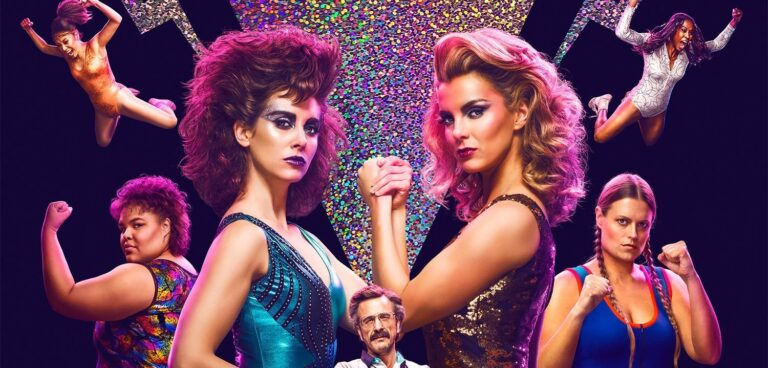As someone who grew up watching the Gorgeous Ladies of Wrestling with my grandmother, the news that Netflix would be producing a new series inspired by the ragtag women’s wrestling league certainly piqued my interest. Created by Liz Flahive and Carly Mensch, and executive produced by Orange is the New Black mastermind Jenji Kohan, GLOW is a highly fictionalized retelling of the events that led to the promotion’s creation in the mid-1980s.
Community alum Alison Brie stars as Ruth, a struggling actress who reluctantly answers a casting call seeking “unconventional women.” She finds herself in a crumbling gym, where B-movie director Sam Sylvia (Marc Maron) is hoping to capitalize on the current pro wrestling craze by putting together a new television series that combines skimpy outfits and sex appeal with the theatricality of the World Wrestling Federation. Ruth may be a serious actress, but a paycheck is still a paycheck, and it beats the hell out of performing in community theater shows for sleepy-eyed patrons.
In need of a recognizable name to launch his new project, Sam lures ex-soap actress Debbie Eagan into the fold with promises of a headlining role. But Debbie’s sub-par athletic ability and lack of enthusiasm for the material leads to her frequently being upstaged by Ruth, exacerbating an existing rivalry between the two women that Sam sees as the perfect opportunity to inject a bit of realism into the show – if they can manage not to kill each other before the cameras begin rolling.

By the end of the first episodes, GLOW has introduced a huge cast of colorful characters that include music video vixen Melrose (Jackie Tohn), former blaxploitation star Cherry Bang (Sydelle Noel), and Sheila the She-Wolf (Gayle Rankin), perpetually clad in black eye makeup and what appears to be animal skins. But with a roster of 12 wrestlers, the series often struggles to give everyone something to do, and there are a number of subplots that are never fully fleshed out. Justine (Britt Baron) pines for a cute pizza delivery guy who disappears for several episodes, while Melrose exploits a tragic moment from Cherry’s past for a couple of cheap laughs, and it’s never mentioned again.
Some of the women are clearly uncomfortable with the characters Sam has asked them to portray – GLOW is accurate in its depiction of minorities being saddled with in-ring personalities based on horrifically offensive racial stereotypes – but there’s very little exploration of those feelings. Even during the finale, as one wrestler bemoans the crowd’s violent reaction to her new identity, she’s blown off by a colleague without any true acknowledgement of her fears. It’s obvious that Debbie and Ruth are meant to be the centerpieces here, and the rest of the series seems like it’s been patched together around them – hopefully, future seasons will take a cue from OITNB and ensure that its supporting cast is given material that is equally engaging.
Brie is spectacular here, and the creators couldn’t have asked for a better actress to carry the bulk of GLOW‘s emotional weight. Ruth’s insecurities are on full display here, with her desire to find success constantly at war with the sheer joy of working on something she’s passionate about. Gilpin also runs the emotional gamut, as her character juggles a rocky marriage and the realization that she can no longer skate by on star power alone, and Maron is clearly enjoying himself as the arrogant, coked-up schlock artist still waiting for his big break.

GLOW does a very respectable job showcasing the grueling physicality of professional wrestling, and the precision required to execute maneuvers that look great to the audience but don’t send your opponent home in a wheelchair. But it also pulls back the curtain to show the complexities of building the product from the ground up – creating characters, writing storylines, and even finding the right venue to host the show. Wrestling fans will find plenty to love, but even those with only a passing familiarity with the sport should be able to look beyond GLOW‘s faults and find enough to propel them through the first season’s 10 episodes.
GLOW will premiere its first season on Friday, June 23, exclusively on Netflix.
GLOW captures the glitz and glamour - and the sleaze - of professional wrestling, with an authentic behind-the-scenes portrayal of the sport's rise to popularity in the mid-1980s. Strong performances from the leads balance out the uneven writing and lack of development for the supporting characters.
-
Score7

